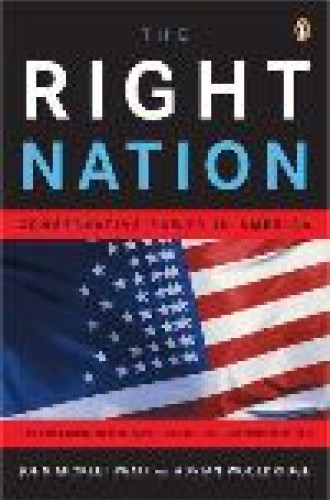The Right Nation
A day before President George W. Bush delivered his acceptance speech at the 2004 Republican National Convention in New York, he appeared at an enthusiastic rally of 21,000 supporters in Columbus, Ohio. It was the kind of political event that would be unlikely to happen in the United Kingdom, Russia or France. Pro-life invocations by Protestant evangelicals, both lay and clergy, intertwined with Ohio State football songs—most appropriately, “Hang On, Sloopy, Hang On!” After one tough-hitting campaign video that charted Democratic presidential candidate John Kerry’s positions on the war on terror, the audience joyously sang the theme song from the 1960s television series Flipper. What is one to make of these conservatives? ask British journalists John Micklethwait and Adrian Wooldridge.
The United States is an exceptional nation, Micklethwait and Wooldridge contend. Americans are more religiously observant and distrustful of government intervention in the economy than are Europeans. In contrast to Europeans, they often emphasize cultural rather than class issues when voting. Most significantly, many Americans see the future as filled with limitless opportunity. Government power, therefore, must focus on assuring equality of opportunity but not equality of condition (the outcome). Herein lies the fault line separating Americans from Europeans and liberals from conservatives, or—as Micklethwait and Wooldridge put it—Texans from New Yorkers.
Drawing upon some of the journalistic and scholarly literature on post-1960s politics, as well as incorporating interviews with conservative activists, the authors introduce the history and values of the New Right. Their book contains many pithy passages, including this gem: “Ronald Reagan supported the church like a flying buttress, from the outside. [George W.] Bush, a born-again Methodist, is more a pillar in the nave.”
Overall, however, their tone is harsh as they warn that religious conservatives and racist southerners—who often appear interchangeable to them—undermine the intellectual integrity of the New Right and threaten to impose their values upon dissenting Americans and the world at large. Micklethwait and Wooldridge are far more comfortable with the secular, libertarian right, which, they fear, has lost ground to religious conservatives with the election of President Bush and the advent of the war on terror.
Micklethwait and Wooldridge draw heavily on Michael Lind, an expert on Texas politics, the Bush family and social conservatism. For the sake of fairness they should have noted that Lind fled the Heritage Foundation, complaining bitterly that social conservatives associated with television evangelist Pat Robertson were intellectually debasing the right. More disturbing, they give much space and credence to Lind’s view that a cabal of Zionist Jewish neoconservatives has hijacked American foreign policy.
Their discussion of post-1960s electoral realignment in the South is similarly problematic. They correctly emphasize the commitment many southern whites had to racial segregation and disenfranchisement prior to the civil rights revolution. Tellingly, they single out Virginia Senator A. Willis Robertson as an ardent racist, noting in passing that his son is Pat Robertson, founder of the Christian Coalition. Since there is no follow-up to this comment, they leave the impression that Pat Robertson is heir to his father’s racist politics. In reality, Robertson rejected racial segregation and refused to campaign for his father’s (unsuccessful) 1966 reelection.
Micklethwait and Woolridge seem not to understand that the poor white Pentecostals Robertson chose to align himself with were much more willing to engage blacks socially than were middle-class Southern Baptists. Before the passage of the 1965 Voting Rights Act, many southern Pentecostals found themselves disenfranchised along with most blacks. When the bulk of these white Pentecostals moved into the Republican Party in the 1980s, their purported racism took a backseat to their embrace of cultural conservatism and a muscular foreign policy. (See Gerard Alexander’s “The Myth of the Racist Republicans,” Claremont Review of Books, Spring 2004.)
A close reading of Jerry Falwell’s 1965 sermon “Ministers and Marches,” a jeremiad that condemned clerical activism, might have enlightened Micklethwait and Wooldridge. As a white Baptist minister, Falwell had a failure of imagination when it came to taking the Christian-infused black civil rights movement seriously. His stance had its racist component, yet his views were also informed by a cultural conservatism that saw poverty and degradation—among both blacks and whites—as the result of sinful behavior.
Those of a more progressive religious bent should take no comfort in Micklethwait and Wooldridge’s scorn for conservative Christians. For example, the authors mock the prison ministry of “reformed Watergate villain” Charles Colson, without bothering to evaluate its successes or failures in rehabilitating criminals. Clearly they have no patience with any variety of religiously inspired political activism. Pat Robertson and Jerry Falwell would share their consignment to the ash heap of history with Martin Luther King Jr. and the 1930s” labor priest” Charles Owen Rice.
Social conservatives can be dogmatic, but the authors’ depiction of dour religious activists does not square with religious conservatives’ boisterous engagement with popular culture. Flipper and Buckeye football are not in the New Testament. This is not to say, however, that religiously conservative voters are willing to embrace all contemporary social trends with calm forbearance. One of the most interesting reactions on the part of GOP delegates to President Bush’s convention speech occurred when he enthused that more women than ever were participating in the work force. Delegates gave only muted applause to this line. While religious conservatives don’t want to emulate the example of the Taliban, many know that a highly competitive economy forces hundreds of thousands of women out of the home and away from their children in order to help support their families. Religiously inspired activists, whether conservative or liberal, temper the excesses of secular humanism and free-market capitalism—and that irks Micklethwait and Wooldridge.





